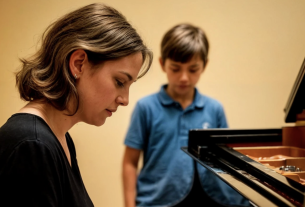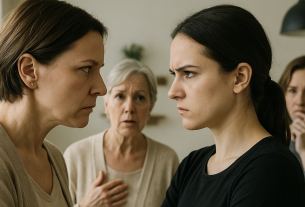So here’s what I was thinking… Let’s give the apartment to Irka. And we’ll crash at your mother’s place for a while,” Vitaliy said without looking up from his phone, poking at his cutlet with a fork.
Olga froze with her cup of tea halfway to her lips. Outside, the rain was drumming against the window, her daughter was doing homework at the kitchen table, the TV in the living room was murmuring something about the weather. An ordinary evening. Until that sentence.
“What?” she whispered.
“Well, you know. Irka’s all alone after the divorce. With the baby. They’re struggling. And we… well, we’ll manage. We’ll stay at your mom’s for now, and then we’ll find something for ourselves.”
He said it in the same tone you’d use to talk about choosing a pizza for dinner. Without looking at her. Without sighing. Without even an apology.
“Are you serious right now?”
“Of course. What’s the big deal? We’re family. Irka’s my sister. We’re not animals, are we?” He finally tore himself away from the screen and looked at his wife as if he were explaining something obvious.
“And who am I? A roommate in a communal flat? Why didn’t you talk this over with me?”
“Ol, you’re not greedy. Your mom lives alone, she’s got three rooms, and we’re crammed in here. And Irka with a newborn is stuck in a tiny two–room place with her mother–in–law.”
Olga felt something crack inside her. Not loudly—more like thin glass in your hand. Not painful yet, but alarming.
“Have you already told her?”
“Well… yeah. In broad strokes. She was in tears, by the way. She practically hugged me through the phone, can you imagine?”
He laughed. He thought he was a hero.
“And when did you decide all this?”
“Yesterday. I talked to your mom too—she’s not against it. Says she’ll be calmer with her grandkids nearby.”
“And you decided just to present me with a done deal? Not worth discussing anything with me?”
He shrugged, as if it didn’t matter.
“What is there to discuss? It’s temporary. Then we’ll buy ourselves something decent. Without these shabby old panel walls. You’re the one who kept complaining about the elevator always being broken.”
“You call shabby the apartment where our daughter took her first steps?! Where I spent two years doing renovations with my own hands while you kept saying your ‘back hurt’?!”
“That’s not what I meant. It’s just… well, you have to help your family. We’re not down to our last. We’ll manage. We’ll earn more. The main thing is to keep our conscience clear.”
Olga felt the word “conscience” like a spit in the face.
In this apartment every wall knew how much that coziness had cost. How many sleepless nights with spreadsheets in Excel, how many trips to the bank, how many humiliations in front of managers to get them to approve an installment plan for the kitchen. Back then, it had been “awkward” for Vitaliy to take out a loan himself—“my credit history’s not so great.”
But hers was. Impeccable. And now—impeccably overloaded.
She slowly got up from the table. Went to the bedroom. Sat down on the bed without turning on the light. The rain outside grew heavier. And for the first time in her life, she realized she was very, very tired of this man.
Tired of the fact that he always “didn’t think it was important,” “decided on his own so as not to burden you,” “well, you’re strong, you can handle it.” And yes—she handled it. Took loans. Took extra shifts on her days off. Took on everything except the gratitude.
And now—this apartment. The home that had been her fortress, her project, her victory over the poverty she’d grown up in. And he was just going to… give it away. To his sister. Because “it’s the right thing to do.”
She turned on the light. Took the notebook where she sometimes wrote down expenses. There were coffee rings on the cover and a greasy stain. She opened a fresh page and wrote:
“How much does my generosity cost?”
The next day Olga went to the bank. Officially, just to check the remaining balance on the loan for the fridge. But in reality—because she couldn’t shake one thought: he had said he hadn’t signed anything without her… But somehow it had sounded strange. Too confident.
The manager smiled politely and tapped at the keyboard.
“Your outstanding balance on the personal loan is 284,000 rubles. Plus 16,000 in interest. Remaining balance on the consumer electronics loan—92,000. And there’s one more active loan—317,000. Taken out six months ago.”
Olga turned pale.
“A third loan? I didn’t take a third loan.”
“It’s in your name,” the employee shrugged. “Here’s the application. Everything’s fine with the signature, the system doesn’t show any signs of forgery.”
She stared at the document, and something inside her howled. The signature really did look like hers. The handwriting was imitated well. But she knew for certain: this was not her hand.
Then her eyes fell on the name of the loan officer. Her jaw tightened. It was Ruslan Gusev. Vitaliy’s friend. His former college classmate. They’d seen him recently at a birthday party—talked about work, banks, mortgages… and joked, “We never leave our own in trouble!”
Olga felt something tear inside her chest.
She called Vitaliy right away.
“Did you take out a loan in my name?!”
“Ol, what are you talking about? What loan?”
“For 300,000. A month ago. Your name is listed as the contact person. Just a coincidence, huh?! And Ruslan—your buddy, by the way—processed it without me even being there. What did you do, give him a box of chocolates as a thank-you?”
Silence. Then:
“Well… Sanya was starting his business. He needed an investment. Ruslan just helped—no red tape, as a favor. I’ll pay it back, don’t worry.”
“In whose name is it?”
“Well… in yours. But I’m paying it myself!”
“You’re lying. You haven’t paid a single kopeck. All the payments are coming out of my account.”
“Ol, you’re doing it again—fainting on the spot. It’s temporary. Sanya will pay it back. He’s a friend, he won’t screw us over.”
Olga burst into tears right there in the car, without even turning on the engine. The navigator’s screen stood there dumbly shining with the route to the daycare. That inner voice she’d been smothering for years—don’t cause a scene, don’t argue, be strong—now whispered something else: and who’s supposed to be strong for you?
In the evening Vitaliy came home with a cake. As if nothing had happened.
“Thought we’d treat ourselves. What’s with the long face today?”
“You realize you forged my signature?”
He waved it off.
“Oh, for God’s sake, so what? We’re family. Are you seriously turning this into a tragedy?”
“Do you respect me at all?”
He smirked.
“Ol, you’re exaggerating. It’s all for us. For our future. For Irka. By the way, Sanya’s almost broken even. I’ll pay it back, I swear.”
“Don’t you think your promises aren’t worth anything anymore?”
“You’re making a mountain out of a molehill. People live up to their eyeballs in debt and don’t whine. And you’re acting like it’s the disaster of the century. It happens.”
“Not with me, it doesn’t.”
She looked at him. He didn’t feel guilty. Not a bit. Only annoyed that his “heroism” hadn’t been appreciated.
And that’s when Olga made her first decision: to find a lawyer.
She found an old business card she’d set aside “just in case.” And thought that this case was exactly one of those.
At the consultation everything was confirmed. Forging a signature is a criminal offense. But the lawyer asked an unexpected question:
“Do you want to punish him or protect yourself?”
She didn’t answer right away.
“I… I want to get myself back. And protect the kids.”
The lawyer nodded.
“Then we’ll start with the paperwork. Do you have any legal rights to the apartment?”
“Technically—no. It’s registered in my husband’s name. But it was bought after we got married. And the main part of the money came from the maternity capital and my loans.”
“Then we’ll be proving your financial contribution.”
Olga walked home feeling a strange sense of relief. As if she had just pulled the first brick out of someone else’s wall at its foundation.
That evening Vitaliy asked:
“What’s with you?”
“I’m just tired. Tomorrow I have somewhere to go. Alone.”
“Where?”
“It doesn’t matter yet. But you’ll find out later.”
He shrugged.
“Your crazy ideas again, huh? Just don’t overdo it, Olya. Who’s gonna live with you besides me?”
She looked at him like at a person who hadn’t yet realized: she’d already stopped being the one who forgives by inertia.
Olga spread the documents out in front of her. Passport, certificates, receipts, credit statements, contracts for appliances, furniture, everything that had turned their apartment into a home. The handwriting on the papers—hers. The signatures—hers. The responsibility—also hers. Only the decisions had always been his.
Vitaliy sat in the armchair scrolling through his feed on the phone, flicking his slipper up with the tip of his toe.
“Why did you lay all those papers out? Reminiscing about how poor we used to be?”
“No. I’m remembering how I was poor. And how you so generously helped everyone—using my money.”
He smirked, still not looking up.
“Here we go. Go on, give your lecture. Like always.”
Olga came up and put a stack of printouts in front of him.
“Here’s your ‘generosity.’ Here’s the loan for your nephew’s laptop—taken out in my name. Here’s your mother’s surgery—also registered to me. Here’s the vacation package to Turkey for Irka—again, I’m the one on the paperwork.”
He put the phone aside and squinted.
“So you’re keeping score now? Don’t you think that’s a bit petty? It’s all for the family, for our loved ones.”
“Petty? And it wasn’t petty when you forged my signature for the sake of a ‘friend’s business’?”
He jumped up, kicking his slipper under the sofa.
“How long are you going to harp on that?! I said I’d pay it back!”
“When?!”
“As soon as—”
“When?!”
He fell silent. And suddenly she saw: it wasn’t that he didn’t know when. He had never even planned to. Never intended to. Didn’t feel guilty. Only annoyed that he’d finally been forced to explain himself.
“You know I was at a lawyer’s office today?”
He tensed.
“What did you do there?”
“Found out how much my gullibility costs. And how much I can get back.”
“Are you insane? We’re family!”
“Family is when they ask you before giving your home away to a sister. Not when they just present you with a fact.”
“Ol, you understand this is temporary. We’d live at your mom’s no problem. Then we’d get a mortgage for something newer.”
“With whose money? Whose credit history? Mine? Or would you just ‘not think about it’ again?”
He stepped closer. Quietly. Breathing heavily.
“You’re just mad right now. But nothing terrible has happened. Everything can be fixed. The main thing is not to wash our dirty linen in public.”
“Dirty linen? This isn’t dirt. It’s rot. And I’m done hiding it.”
She took the folder with the apartment documents from the shelf and handed it to him.
“Look. Everything’s registered to you. But it was bought with my money. With the maternity capital and two loans—also mine. I’m going to prove it. And you’re going to lose.”
“You’re really going to take me to court?!”
“No. I’m going to protect myself. And my children. Because you haven’t thought about us even once.”
He dropped into a chair. Abruptly. As if his legs had been knocked out from under him.
“Olya… Come on… I just wanted to help… I thought you’d understand…”
“I understood. Very clearly. You didn’t want to help. You wanted to look good. Generous. Noble. The kind of guy everyone would praise—‘what a brother, what a husband, what a friend.’ And the fact that I paid for all of that—didn’t matter to you at all.”
“I didn’t mean any harm…”
“And I don’t want to be loved ‘without meaning any harm’ anymore.”
She looked him straight in the eyes.
“I’m filing for divorce. And starting the process to review our shares in the property. And if you so much as lay a finger on this apartment without my consent—I’ll also open a criminal case.”
He lowered his head.
“You can’t do this. We have kids.”
“Exactly. We have kids. And they don’t need a father who sacrifices their home for the sake of other people’s gratitude. They need a parent who knows how to think. And ask. Not someone who treats other people’s things as his own.”
He stayed silent for a long time. Then said quietly:
“I never thought you were capable of this…”
“And I never thought you were capable of everything you’ve done.”
She stood up and took her jacket from the hanger.
“I’m leaving. But not from this home. I’m leaving your shadow.”
And she closed the door—softly, but in a way that made the whole old hallway tremble.
Olga sat in the courthouse hallway, clutching a folder of documents. Inside were calculations, statements of paid-off loans, bank printouts, receipts from the furniture store, copies of the maternity capital paperwork. Every little slip of paper was like the trace of a blow that she herself had endured.
The hearing lasted less than an hour. Vitaliy came with his sister and a lawyer—clearly hoping to “split everything fifty-fifty.” But the judge listened closely to the arguments, studied the documents and asked only one question:
“In whose name were the loans taken out?”
The answer was the same every time—Olga’s.
“Who made the payments?”
Again—Olga.
“Who can confirm the expenses for improvements and maintenance of the apartment?”
Yet again—Olga. The banks. The invoices. The proof.
In the end, the court recognized her contribution as decisive. The apartment remained hers. Vitaliy received financial compensation, but the amount was tiny compared to what he had counted on.
When they walked out of the courtroom, he shuffled along behind her, angry and confused.
“Happy now? Humiliated me. Aired our dirty laundry. Disgraced the whole family.”
“No,” she said without looking back. “I just got my voice back. And stopped paying for someone else’s generosity.”
He caught up with her at the entrance.
“And the kids? Did you think about them? They need a father.”
“They don’t need a man who sacrifices their home for the sake of strangers’ gratitude.”
“I’ll change. I’ll find a job. Start from scratch. Take me back.”
She looked at him calmly. For the first time in a long while—without pain.
“You’ve already started from scratch. From your zero. Good luck.”
And she walked away.
Three months passed. Olga sat out on the balcony, sipping coffee and watching her daughter kick a ball around the courtyard with the neighbor kids. In the bedroom her son was learning English through an online course—she had finally been able to pay for a subscription.
The apartment was the same, but the air was different. Cleaner. Freer.
Vitaliy now lives with his sister. In that very apartment from which he had planned to move her into their flat. Only now he sleeps on a folding bed. Without cake. Without an audience.
Olga applied for debt restructuring. She recorded a video about how to deal with loans—for women whose “husband always handled everything himself.” The video got ten thousand views. She made a second one. A third. Started a blog. And for the first time in her life she realized: someone was actually listening to her. Because her voice was real.
She wrote in her diary:
“A woman is not a decorative backdrop for someone else’s generosity. She is a home you cannot just take and give away.


